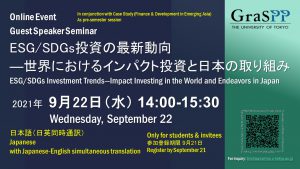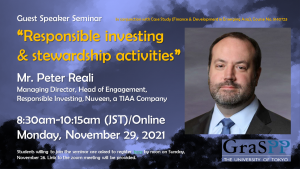Summary
November 29, 2021 “Responsible investing and stewardship activities”
Impact investing is an investment strategy in pursuit of both financial returns and a positive social impact to address such challenges as eradicating poverty, reversing environmental degradation, and achieving equitable and inclusive societies. Investment with environmental, social and governance (ESG) considerations is an approach to impact investing. As the global community shares the UN Sustainable Development Goals (SDGs), investors are increasingly attentive to approaches taken by companies and projects to contribute to achieving the SDGs.
Against this backdrop, the following webinars were held in conjunction with the course “Case Study (Finance and Development in Emerging Asia)” in partnership with Nuveen, a US-based asset manager and a wholly owned subsidiary of Teachers Insurance and Annuity Association of America (TIAA).
September 22, 2021 “ESG/SDGs investment trends—impact investing in the world and endeavors in Japan”
MC: Ms. Momori Hirabayashi (Class of 2020, GraSPP)
“How do global institutional investors see the promise of ESG/SDGs investment?”
Mr. Michinobu Suzuki, CEO, Nuveen Japan Co. Ltd.
Panel discussion “Japan’s endeavors and prospects in impact investing”
Mr. Shohei Hara, Director General, Private Sector Partnership and Finance Department, Japan International Cooperation Agency (JICA)
Ms. Lisa Inoue, Assistant Vice President-Client Relation & Product Management, Nuveen Japan Co. Ltd.
Mr. Masahiro Kato, Head of Responsible Investment, Mitsubishi UFJ Trust and Banking Corporation (MUTB)
Moderator: Prof. Toshiro Nishizawa
September 22, 2021 “ESG/SDGs investment trends—impact investing in the world and endeavors in Japan”

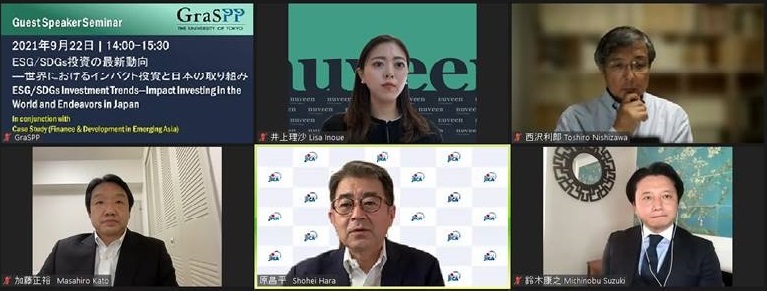
November 29, 2021 “Responsible investing and stewardship activities”
Mr. Peter Reali, Managing Director, Head of Engagement, Responsible Investing, Nuveen, LLC


“ESG/SDGs investment trends—impact investing in the world and endeavours in Japan”
Introduction by Prof. Toshiro Nishizawa
Traditionally, investments were considered along two axes: the axis of return, and that of risk. Now impact is emerging as a third new axis on which to consider investments. Indeed, the social and/or environmental impacts of investments are increasingly included in investment considerations. Environmental, Social, and Governance (ESG) investments focus on incorporating such ESG factors that were previously considered as “externalities” into investment analysis, thereby unleashing the potential for investments to yield to a better society.
Just two decades ago, companies and governments showed low interests in subjects such as corporate social responsibility (CSR) and triple bottom-line (TBL). However, the challenges humanity is currently exposed to, from extreme weather events to natural disasters to the pandemic, have shed light on the importance of achieving resilient, equitable and prosperous societies. Moreover, momentum was witnessed after 2015 with the adoption of UN SDGs. Financial institutions are now increasingly focused on ESG and SDGs to innovate their investment approaches. Some of the firms leading in the realm of impact investing were invited to the webinar.
Presentation by Mr. Michinobu Suzuki, CEO, Nuveen Japan Co. Ltd.
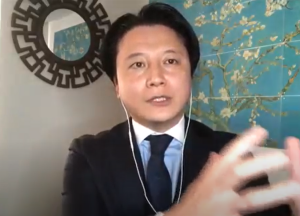
Nuveen shared its expertise in impact investing, SDGs and ESG during the webinar. Nuveen focuses its impact work on three key pillars: SDGs, climate change, and inclusion and diversity. To achieve SDGs, knowledge transfer is fundamental. It helps leverage resources from a wider pool of organizations and increases the potential impact of investments. Nuveen transfers its knowledge to other stakeholders through university courses and collaboration with other asset managers. To respond to climate change and related challenges, Nuveen issues green bonds and is working on developing and deploying new investment products (e.g., blue bonds). It pursues impact investing to address other challenges as well, such as inequality, and diversity and inclusion (D&I). To address inequality, for example, Nuveen uses municipal bonds (project finance) to contribute to the improvement of local communities, or private equity investments to improve the quality of food offered at school cafeterias. On the other hand, to improve D&I (main area of focus in Japan), Nuveen is committed to improving gender diversity and women’s participation across different fields and roles.
Nuveen observes that ESG can be incorporated into investments in three ways: integration, engagement, and impact investing. Integration is when ESG factors influence the stock selection and asset allocation processes. Engagement is when investors work with listed companies on pursuing improvements in ESG issues through regular conversations and by deploying their voting rights. Lastly, impact investing is an approach where investments are pursued to achieve environmental and social outcomes while also gaining commercial returns. Japan is excelling in the first two areas, but still lacks behind as far as impact investing is concerned.
According to a survey conducted by Nuveen, 70% of institutional investors across the globe agree that engagement and integration are important while the level of agreement over the importance of impact investing is lower. In the same survey, Nuveen also found that 60% of investors believe that ESG will help with risk management, and that 40% think it will help gain superior risk adjusted returns (alpha). Over time, as impact investing grows, it is likely that a third axis of impact is going to be added to investment considerations. That is, investors will have not only to optimize for the efficient frontier, but also to consider the impact on society and environment.
Presentation by Mr. Masahiro Kato, Head of Responsible Investment, Mitsubishi UFJ Trust and Banking Corporation (MUTB)
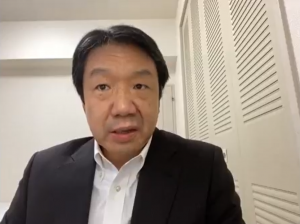
A change can be also seen in ESG trends as they show a transition from SRI to ESG, and then to impact investing. Impact investing can be considered as a more encompassing approach to pursue impact alongside optimizing for risks and returns. MUFG is another financial institution committed to ESG ever since the launch of UN PRI in 2006. MUFG Asset Management and its subsidiaries, through a Responsible Investing Policy, now factor-in ESG for all their assets under management (AUM). MUFG highlights the importance of double materiality: impact on investees, environment, and societies on one hand, and impact on corporate value on the other.
Measuring social/environmental impact is another key aspect of impact investing. Impact measurement involves a logic model, where one starts with an activity, identifies relevant outcomes, and the associated impact. However, it is extremely difficult to measure and analyse impact on society. A first important step towards developing a measure of impact is information disclosure. This, in turn, is a challenging topic because it is not easy to standardize the kind of information that investors seek from investees. Furthermore, determining the materiality of such information on relevant impact/financial outcomes is difficult. For these reasons, investee firms may not always disclose information. The growth of impact investing requires enhanced information reporting.
Presentation by Mr. Shohei Hara, Director General, Private Sector Partnership and Finance Department, Japan International Cooperation Agency (JICA)
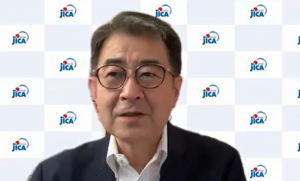
JICA focuses on the economic development in developing countries and supports their private sector activities with the element of impact investing. In addition to grants and technical cooperation, JICA provides yen loans to governments in developing countries and also offers loans or equity to private companies that are working toward economic, social, or environmental development. Moreover, JICA is committed to addressing climate change challenges, poverty alleviation, and achieving SDGs. Significantly, JICA is also a signatory to the Operating Principles for Impact Management (the Impact Principles) with International Finance Corporation (IFC), a member of the World Bank Group, serving as initial host of the Secretariat.
A few examples of JICA’s initiatives globally include: collaboration with Asian Development Bank (ADB) to enhance water supply capacity in Vietnam, thereby improving hygiene and health of local communities; joint investment with Sumitomo Mitsui Banking Corporation (SMBC) in Egypt to provide credit facilities for Micro-, Small and Medium-sized Enterprises (MSMEs) and to help support and grow the number of women-led SMEs; and Delhi Metro (subway) project, which introduces train cars just for women enabling safe travel. More recently, JICA issued a gender bond, a first of its kind in Japan, which was oversubscribed, thanks to the great interest from several investors including regional banks in Japan. In addition, JICA underlines the importance of accurate and precise reporting of the impact to target beneficiaries resulting from such investments.
Presentation by Ms. Lisa Inoue, Assistant Vice President-Client Relation & Product Management, Nuveen Japan Co. Ltd.

The history of responsible investments is said to have originated from negative screening by Christian funds in 1970s. In the 1980s, the focus shifted to the anti-apartheid movement. Most recently, attention has been paid to racial issues as well as climate change related concerns. With the onset of COVID-19, investor interest for sustainable bonds, green bonds and social bonds has increased. Examples of social bonds include vaccine bonds in 2018 with the International Finance Facility for Immunisation (IFFIm), where the proceeds were used for vaccination for children in developing countries. Most recently we have witnessed the emergence of bonds to fight COVID-19, issued by African Development Bank (AfDB). From the history of responsible investments, we see that bonds are developed from crises and are aimed at addressing issues deemed as important at certain points in time.
As ESG and impact investments are gaining increasing relevance, it is important to guard against activities such as greenwashing, where the proceeds of investments considered “green” are deployed in activities which are not necessarily eco-friendly. Such activities are problematic because they channel capital to projects which do not truly have an impact, thereby worsening the image of impact investing/ESG. Once again, information disclosure emerges as a possible solution to guard against greenwashing.
Nuveen recognizes the importance of clear reporting of impact in-line with JICA’s approach. Moreover, the following elements have to be present if one wants to pursue impact investing: the investment needs to have a positive impact on society and communities; the impact has to be direct and measurable; there needs to be clarity over the usage of proceeds; impact reporting must be done, with numerical measures disclosed; investees should be engaged to address potential downside risks, including governance issues; and investees must report to investors about progress on ESG matters.
Panel discussion
Prof. Nishizawa: Why did it take time for Japan to focus on impact investments? What is the future of ESG outlook?
Mr. Kato: For an issue to be addressed, it must attract interest among investors and companies to such extent that they are willing to spend time on engaging with the issue. Firms taking ownership of the issue is a key turning point. Natural disasters increased people’s awareness of the need for engagement and ownership to address difficult challenges facing us in Japan.
Prof. Nishizawa: Please share some of the examples of how impact investing and ESG are pursued in developing countries.
Mr. Hara: For example, there is heightened attention on impact investments and ESG in India. JICA is now financing projects without any involvement of Japanese corporations by directly working with local firms who are engaged in impact investing.
Prof. Nishizawa: Disclosure and tougher regulations are important, but they may add to the work burden and costs to companies and asset managers. What do you think?
Ms. Inoue: It is true, but it is also possible to work with the government or third parties to streamline the assessment projects. Also, the burden can be reduced if there is standardized framework on measurement. Furthermore, knowledge sharing of best practices helps reduce the burden. It is important to build soft infrastructure for promoting impact investments.
Mr. Kato: Regulation may seem tough in the short run, but disclosures are necessary in the long term. There should be clarity on the specific metrics to be disclosed.
Mr. Hara: Developing a methodology with the help of third parties or collaborating with JICA is another option. A key question is how to create an ecosystem for measuring impact.
Prof. Nishizawa: Universities can also play an important role in knowledge building and sharing, constituting to the soft infrastructure needed to promote impact investing.
Wrap-up by Prof. Nishizawa
Impact investing represents a paradigm shift by adding a third dimension to investment considerations alongside risk and return. This shift is not without challenges, but they must be overcome. Although lagging on ESG just 10 years ago, Japan is now among the leading countries in ESG integration and engagement. Now that private sector firms and government bodies are working toward promoting impact investing, there is a good chance that Japan will be a future leader in impact investing.
Questions from the audience
Q: What kind of initiatives are needed for impact investing to progress in Japan?
Mr. Hara: Sharing knowledge of good practices, building an ecosystem for knowledge sharing and transfer among others would help promote impact investing in Japan.
Q: University of Tokyo is issuing social bonds. Since issuing bonds by universities is a new phenomenon in Japan, how do investors engage with universities?
Mr. Suzuki: Investors should monitor if the proceeds are used for activities as intended by the bond, and if the stated impact objectives are achieved. In the case of University of Tokyo’s bonds, investors should assess if the intended research activities with implications for social/environmental impact are pursued, and if the expected research outcomes are achieved.
Summary prepared jointly by Martina Marsili and Karthik Varada
“Responsible investing and stewardship activities”
Mr. Peter Reali (Managing Director, Head of Engagement, Responsible Investing, Nuveen, LLC) joined the students as a guest speaker to discuss responsible investing and stewardship activities.
Lecture summary
Responsible investing as an investment approach matters not only to those investors and stakeholders hoping to align their moral values with their investments. Rather, making investments “responsible” by incorporating Environmental, Social and Governance (ESG) factors in the investment process is associated with benefits such as being able to generate outcome, to manage top global risks in terms of impact, and to create market opportunities which are estimated to be around $12 trillion. Nuveen is a large asset manager, which has over 1 trillion dollars in assets and a long history in responsible investing. Nuveen, and in particular its engagement/stewardship team, encourages change in many ways, such as engaging with policymakers, conducting tactical dialogues with the companies they invest in and through proxy voting at board of directors’ meetings.
Several challenges to impact investment remain. Firstly, it can be hard to maximize the performance of funds on behalf of clients while contributing to reaching ESG related objectives. Indeed, there is usually a tradeoff associated with changes required for a company to move towards ESG goals. The second challenge is the lack of an international framework for impact investing, which would enforce companies to disclose relevant information in a detailed and standardized way. This complicates the process of evaluation of a company’s performance with regards to ESG related issues.
To address the first challenge, Nuveen believes that engagement, rather than disinvestment, is the optimal solution in the long-term. Through continuous engagement and tactical dialogues, and by holding directors accountable at boards of directors’ meetings, we can drive effective change. To address the second challenge, Nuveen puts emphasis on transparency as a fundamental first step towards better ESG practices. Next important step is for the company to create and maintain a system of internal accountability. To determine whether set targets have been realized, performance needs to be assessed against specific KPIs. Aside from encouraging internal accountability, Nuveen also has an internal set of standards it uses to evaluate companies, and it makes sure to collect data against those standards, by inquiring the companies about them and through tactical engagements.
Case exercise
Students were tasked with finding answers to the following questions.
“Should ABC (a hypothetical company) sell its fossil fuel investments to SMOG (another hypothetical company)? How should ABC balance the short-term needs of its client vs the long-term sustainability implications? Instead of divestment, what other approaches could be considered by ABC? What types of public policy work could support ABC’s initiative to reduce carbon emissions while also protecting the financial interests of its clients?
“How do we balance the short-term need with the long-term goals for climate neutrality? If disinvesting is not an option, what are some tools to our disposal?
“What could policymakers do to ensure that all players around the value chain have the same incentives?”
Student: I am not sure if it is possible, but I would suggest disinvesting a portion. In this way we could limit the bad impact and put pressure. In the long run, we could be looking for better opportunities, better investments.
Student: We were thinking about quantifying the effect of investment and disinvestment. Also, it is important for investors and Nuveen to have shared values. From this case we can see an example of the importance of stewardship.
Mr. Reali: Yes, let me make a couple of comments. The word divestment means that I will not have any kind of exposure to that kind of security. Selling potentially some shares is about positioning your portfolio, and this is what we are trying to do at Nuveen, not just for ESG products, but across the board. We are trying to maintain ownership to an extent where it makes sense, while possibly diverting some of those investments to offset the negative impacts. Even in ESG branded products, we take the “best in class” approach. We are not going to be owners of a particular industry of companies, but rather not old “some of the bad ones” and direct investments towards “some of the good” ones. What you are describing is smart investing, and is about properly positioning your portfolio.
Anything on the policy front?
Student: In our group someone mentioned about carbon pricing. If there is sufficient amount of price for carbon, then it helps level the playing field.
Student: In Indonesia ESG investing has not really taken off. Does Nuveen have plans to expand to developing countries?
Mr. Reali: We do various activities, like partnering with like-minded partners, universities or even governments. We are considering expanding to the sovereign fund area, so working directly with governments.
Student: Instead of selling to SMOG a private company, perhaps it would be better to sell it to the government.
Mr. Reali: That would have to be a policy that the government would buy the asset. My takeaway from your comment is that the solution needs to be big and bold, to make change happen in the timeframe that we need to make it in.
Concluding remarks
Mr. Reali: Some of the targets the world has set for itself, especially with regards to climate change, require a large and rapid shift. In order to be able to really make this shift, it is necessary for all companies, policy makers, investors and stakeholders to come together and play a role. Last but not least, I believe that thinking big, thinking bold is the only way we are going to be able to solve it.
Prof. Nishizawa: There are many challenges in impact investing. One is the lack of consistent and comparable data. Nuveen is trying to fill the gap by promoting transparency and accountability and to nurture active ownership ideally with a shared mission. What is the role of public policy? Perhaps to design effective incentives while minimizing market distortions.
Summary prepared by Martina Marsili


